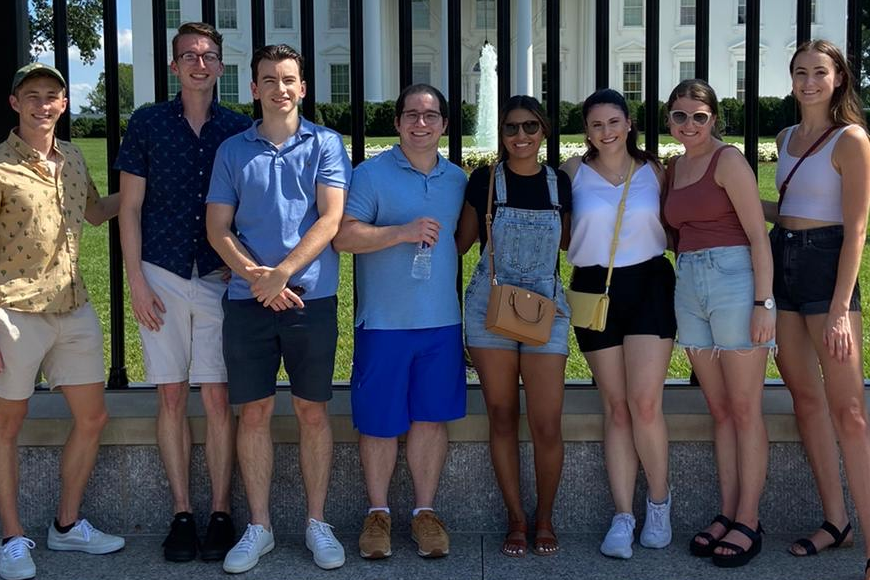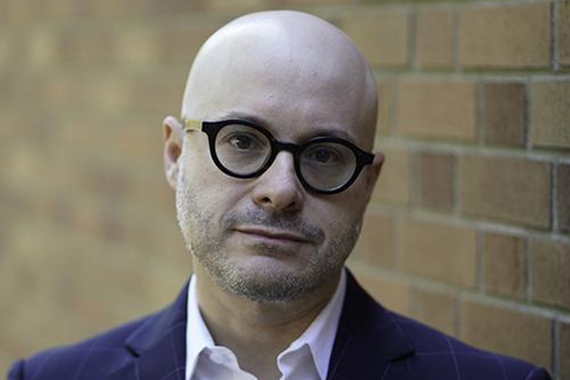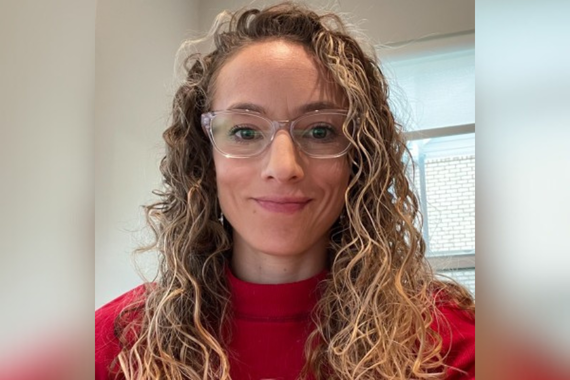POL Students Participate in Prestigious Summer Seminar
Two promising political science students took Professor Mark Bell’s Politics of Nuclear Weapons course and used it as a springboard to travel to Washington DC for the Johns Hopkins School of Advanced International Studies Kissinger Summer Academy, which Professor Bell described as a “prestigious and competitive program.”
Noah Thompson and Sydney Kakuk applied for the Summer Academy fellowships at Bell’s urging. They were accepted and immersed themselves in the week-long seminar dedicated to revisiting debates over nuclear strategy during the Cold War, considering how US policymakers have addressed challenges such as non-proliferation and rogue states, and exploring the role that nuclear weapons will have in shaping American competitions with Russia and China today.
What they did at the academy
“Each day we would hear lectures on nuclear strategy,” Thompson reported, “as well as the policy issues that the international community has faced in the past and will face in the future when it comes to nuclear weapons policy.”
Thompson and Kakuk engaged and debated with leading academics in their field of expertise while attending captivating lectures. The seminar culminated in a day of war game in which the students tested the strategies they had debated in a simulated international conflict.
In addition to the prestigious scholars leading the program, the Summer Academy Fellows met with “a former ambassador, a former undersecretary for missile defense, a CIA intelligence analyst, and a senior Nuclear Engineer with the Johns Hopkins Applied Physics Lab,” Thompson explained.
What they learned
Attending the seminar left Thompson with “a more nuanced understanding of what it takes to create policy in the international sphere, especially when it comes to a topic as complex as nuclear policy.”
While Professor Bell’s course first sparked Kakuk’s interest in nuclear weapons, attending the Summer Academy drove her to engage with the subject to an even greater extent. “I enjoyed Professor Bell’s class so much that I was searching for opportunities to learn more about nuclear weapons and the role they play in the international arena,” Kakuk expressed. “I learned an incredible amount about how nuclear weapons are made, their effect on the international landscape, their strategic significance, as well as the phenomena of escalation and deterrence.”
As a double major in political science and music in vocal performance, Kakuk combines two unique interests in her study of foreign policy and her plans for after graduation. “I first became interested in studying politics more in depth after I was exposed to the political nature of classical music,” she said. “My dream is to have a seat at the negotiation table to discuss non-proliferation and the disarmament of nuclear weapons around the world on behalf of the United States of America while practicing preventive diplomacy by making powerful connections through art.”
Their takeaways from the academy experience
In addition, Kakuk took away an important understanding after interacting with leaders in the academy and the policy world at the seminar. “I’ve learned that security studies lack diversity and needs to be more human in general, which is why I am interested in making connections through music while advocating for more ethical ways to prevent and conduct conflict,” she said. “Security studies and discussions regarding weapons of mass destruction need to take human lives into account, as well as realize the legacy of racial and gendered consequences of such weapons.”
The mentorship and support from University of Minnesota teachers like Professor Bell have inspired Thompson to study international law after earning his undergraduate degree. “My professors have believed in me and it has helped me believe in myself,” Thompson related. He believes this important support will allow him to “help contribute to the discourse I have enjoyed learning during my time at the University of Minnesota.”
“I’m delighted that some of our political science majors, who did a great job in my class, were able to take advantage of this opportunity to travel to Washington DC and learn about some of the most important issues relating to nuclear weapons in the world today,” said Professor Bell, “and to learn about them from an incredible and diverse range of thinkings and practitioners.”


